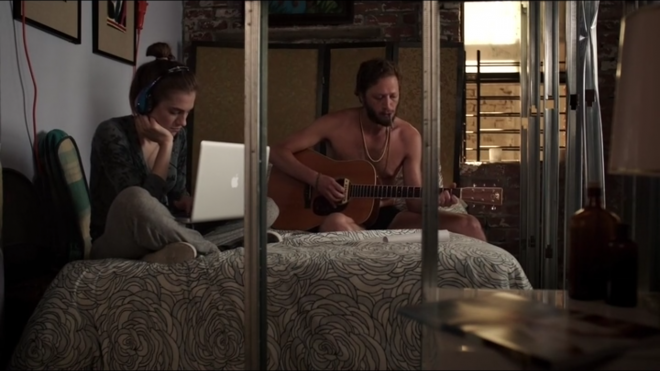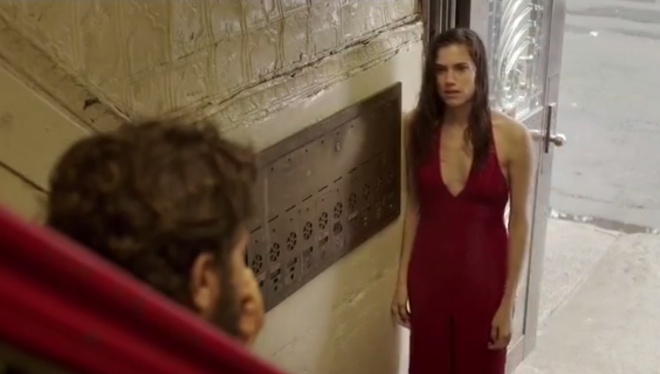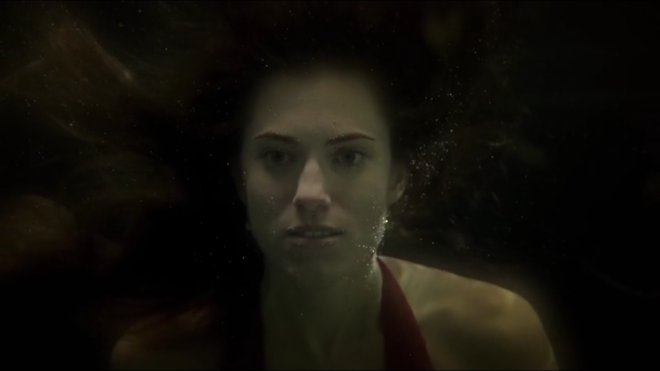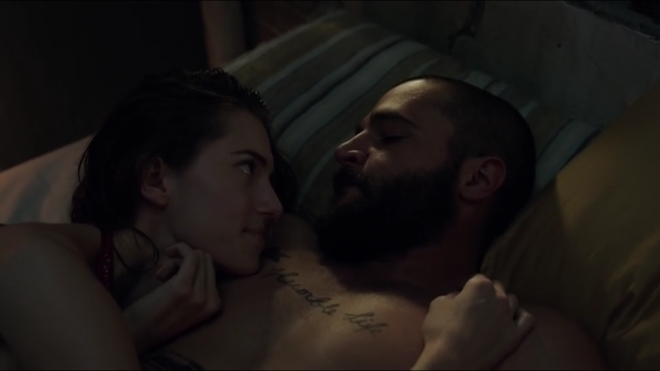‘Girls’ Recap: Sorry, Marnie Just Got A Whole Lot More Likeable
This may be the most beautiful story Lena Dunham's given us yet.

This is a recap of the latest episode of Girls. Spoilers!
–
Marnie takes a short journey the long way in this episode. At the beginning, she’s literally (in the visual sense) in a cage: the bright metal bones of the wall Desi decided unilaterally to spend $3,000 on building in their studio apartment, because he can’t see the distinction between delineating spaces and adding space. She’s visibly tense, bored, fuming, framed by the headphones she’s using to try and block out Desi’s entire presence. She’s perched as far away from him on the bed as she can get, and she can’t even go anywhere to escape whatever he’s “looking at [her] about” because he hasn’t finished the bloody wall.
At the end of this episode, she’s at the bottom of the stairs to the apartment, freeing herself; she is light and relieved, clean and young. Out of the cage, Desi’s problems aren’t hers anymore, and she knows (for now, at least) she’s got to sort her own shit out before she makes herself responsible for someone else’s again.
Marnie, at almost every stage of this show, has defined herself through the men in her life. It’s not necessarily a product of her apparent lack of a relationship with her father, but it’s certainly partially a product of her mother’s priorities (looks, diet, trying not to visibly age). The approval and caring attention of men influences her in clear ways. She and Charlie started dating after he looked after her during a weed-brownie incident at a party in college; she had to race into a bathroom for an emergency wank after Booth Jonathan told her he might scare her in bed, because he was “a man“; she slept with Ray after he gave her an incisive, brutal, considered dressing-down; she chased Desi aggressively after he tossed her a few smiles and compliments about her singing.
Marnie needs to feel seen. She’s used to being looked at — the way Charlie’s new friends and his rich old coke customer look at her — she has little patience with it, not from guys like that. But the minute a guy who’s charming or handsome or smart pays attention to something beyond her looks, whether it’s a positive or negative trait, she feels valued and visible.
She has however grown on this front. Marnie has enough self-respect now to call Charlie out on his exit strategy of radical “honesty” two years ago, and has been increasingly less susceptible to Desi’s whining and wheedling. The last few episodes have seen her standing up for her own needs and regularly calling him out. She wasn’t strong enough not to go through with the “dream” wedding, but she’s more in touch with reality now; when Charlie says that it’s beautiful that she got married, she says “it was”. Past tense. She goes on to talk about the wedding itself, but she also seems to mean the marriage itself.
So why does she go with Charlie to the party? Because old Charlie makes her want to, as Desi puts it, remember the hope she used to feel at the beginning. New Charlie makes her think of roads not taken, both then and yet. Running into an Old Love will do that: you feel like someone’s laid out your Then Self and your Now Self next to one another, like tarot cards or a hand of poker, and you’re suddenly very aware of the next one about to be flipped up from the pile of potentials.
And the thing is, Marnie and Charlie’s night is beautiful. ‘Panic In Central Park’ is one of the most stunningly shot episodes since ‘Sit-In’, with the same dreamy, indie-film romance of ‘One Man’s Trash’ (the one where Hannah shacked up with Patrick Wilson, to which this feels like a companion episode), and it is full of cinematic nuance taking inspiration from the 1971 film The Panic In Needle Park. The visual callbacks are bountiful too. There’s the underwater shot recalling Jessa’s revelatory birthing-bath plunge last season, the Central Park boating scene that I could swear is a shoutout to The Little Mermaid‘s ‘Kiss The Girl’, and the dark pink dress that is less current-hippie-wannabe-neutrals Marnie than girly post-college Marnie (think of her hostessing shorts, or that Booth scene again).
But it’s not all perfect. Charlie is broken. It’s not her fault — as awful as it is that he didn’t feel he could share his grief over his father with her — his abandonment issues were hinted at early on. But this is a dark way to bring back a character who was a sweet, slightly dull indie bro when we saw him last. In seasons one and two Charlie was a wounded puppy dog with great stubble; the Brooklyn-basic eye candy next to weirdo Driver and his cantankerous bandmate Ray. This week, Christopher Abbott projects Charlie’s bleak new reality beautifully, while letting his old, faintly petulant sweetness shine through the manipulative, charming, functioning junkie.
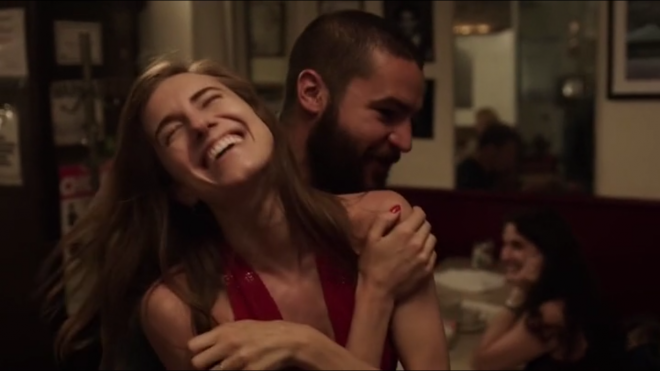
… Is this the role Christopher Abbott could finally “relate to on a personal level”?
The signs of Charlie’s drug use are everywhere: the handoff with his bizarro-world-Entourage mates as they leave, the way he pats his pockets when he leaves to find the burger-joint bathroom, and comes back sparking and manic, even the hoarseness and deeper voice (which can sometimes come as a side effect of heroin use). Marnie doesn’t really bat an eyelid at him dealing coke, because coke is a cool, rich, startup-people drug — she knows people who do coke, even if she doesn’t do it herself. What she notices, she brushes off as the changes that happen over years; he doesn’t know what her scene is, she reasons, so she doesn’t know his any more.
She seems ready to go with him, right up until she finds the needle (because she’s picking his clothes up off the floor — oh, honey). Allison Williams earns every moment in this episode but she is stunning in that one particularly, the way she shifts at his easy lie about being “diabetic”, seeing the night before for what it was.
Did she feel like she had to break something in her marriage to know whether she still wanted to be in it? Part of me wondered if she would break down when she returned to Desi, if she’d confess tearily every part of the night she’d just had, from the chance meeting to the boat and the needle. He’d either fly into a rage and prove to her what an irredeemable turd is truly is or be surprisingly, self-sacrificingly understanding and suck her back into his orbit of scone-related tantrums and suicide threats and shitty ideas.
But whether she considered it on that long barefoot walk home or not, she ultimately keeps the night for herself. She’ll tell Hannah (these are things you tell a friend who barely wakes up when you let yourself into her house and climb into her bed), but she doesn’t tell Desi. She packs a few things and leaves.
Maybe she meant what she murmured onto Charlie’s chest, across his cheap tattoo that says “Humble life”, that she doesn’t need her stuff; maybe that was a true moment of revelation after having her rings taken off her at gunpoint and staying rosy. Maybe she thought: if I can consider leaving it all behind for Charlie after one absurd night, I can leave it all behind for me.
Maybe she’ll write a really fucking good song about it. Maybe she’s going to continue being the exact same 25-and-a-half-year-old asshole we know and love (to daydream about murdering). Maybe we’ll finally get to see Ray happy. Maybe she’ll go and get her cat back.
Marnie might still be the worst, in her own way — especially if we never see Desi again, which would be no loss whatsoever. But with an episode like this, Girls has earned every insufferable Marnie speech for the rest of the season. For all her autobiographical grandeur in the vintage store, she lives more in this one day than she really has in ages. It’s impossible for even the most ardent Marnie hater not to love her at least a little more by the end.
–
Girls airs on Showcase at 7.30pm Tuesday nights.
–
Caitlin Welsh is a freelance writer who tweets from @caitlin_welsh. Read her Girls recaps here.


